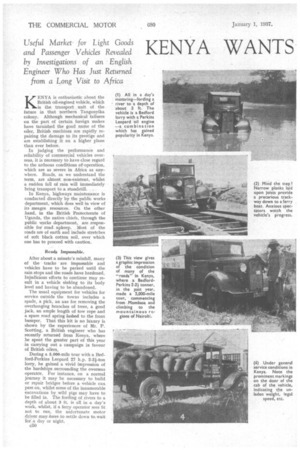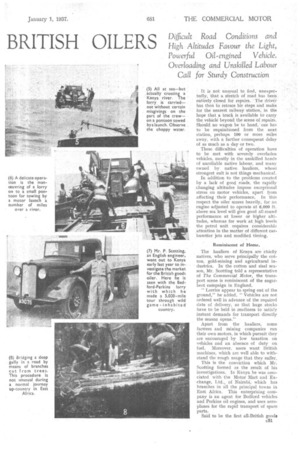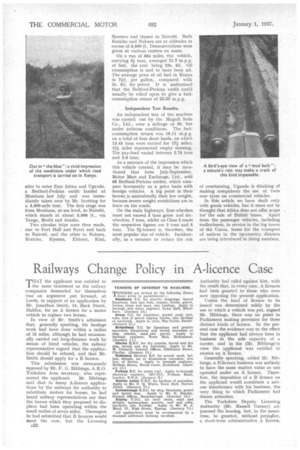KENYA WANTS BRITISH OILERS
Page 100

Page 101

Page 102

If you've noticed an error in this article please click here to report it so we can fix it.
KENYA is enthusiastic about the British oil-engined vehicle, which is the, transport unit of the future in that northern Tanganyika colony. Although mechanical failures on the part of certain foreign makes have tarnished the good name of the oiler. British machines are rapidly repairing the damage to its prestige and are establishing it on a higher plane than ever before.
In judging the performance and reliability of commercial vehicles overseas, it is necessary to have close regard to the arduous conditions of operation. which are as severe in Africa as anywhere. Roads, as we understand the term, are almost non-existent, whilst a sudden fall of rain will immediately bring transport to ,a standstill. ,
In Kenya, highways maintenance is conducted directly by the public works department, which does well in view of its meagre resources. On the other hand, in the British Protectorate of Uganda, the native chiefs, through the public works department, are re:spansible for road, upkeep. Most of the roads are of earth and include stretches of soft black cotton soil, over which one has to proceed with caution.
Roads Impassable.
After about a minute's rainfall, many of the tracks are impassable and vehicles have to be parked until the rain stops and the roads have hardened. Injudicious efforts to continue may result in a vehicle sinking to its body level and having to be abandoned.
The usual equipment for vehicles for service outside the towns includes a spade, a pick, an axe for removing the overhanging branches of trees, a good jack, an ample length of tow rope and a spare road spring lashed to the front bumper. That this kit is no luxury is shown by the experiences of Mr. P. Scotting, a British engineer who has recently returned from Kenya, where he spent the greater part of this year in carrying out a campaign in favour of British oilers.
During a 5,000-mile tour with a Bedford-Perkins Leopard 27 h.p. 2-2i-ton lorry, he gained a vivid impression of the hardships surrounding the overseas operatcir. For instance, on a normal journey it may be necessary to build or repair bridges before a vehicle can pass on, whilst some of the innumerable excavations by wild pigs may have to be filled in. The fording of rivers to a depth of about 2 ft. is all in a day's work, whilst, if a ferry operator sees fit not to run, the unfortunate motor driver .my have to settle down to wait fora day or night.
c50
It is not unusual to find, unexpectedly; that a stret4 of road his been entirely closed for repairs. The driver has then to retrace his steps and make for the nearest railway station; in the hope that a 'truck is available to carry the vehicle beyond the scene of repairs.
• Should no wagon be to hand, ' one has to be requisitioned from the next station, perhaps 100 or more miles away, with a further consequent delay of as much as a day or two.
These difficulties of operation have to be met with severely overladen vehicles, mostly in the unskilled hands of unreliable native labour, and many owned by native hauliers, 1.vhosd strongest suit is not things mechanical.
In addition to the problems created by a lack of good roads, the rapidly changing altitudes impose exceptional stress on motor vehicles, apart from affecting their performance. In this respect the oiler scores heavily, for an .engine adjusted to operate at 6,000 ft. above sea level will give good all-round performance. at lower or higher altitudes, whereas for work at high levels the petrol unit requires considerable .attention in the matter of different carburetter jets and modified. timing.
Reminiscent of Home.
The hauliers of Kenya are chiefly natives, who serve principally the cotton, gold-mining and agricultural industries. Inthe cotton and sisal season, Mr. Scotting told a representative of The Commercial Motor, the transport scene is reminiscent of the sugarbeet campaign in England.
" Lorries appear to spring out of the ground," he added. " Vehicles are not ordered well in advance of the required date of delivery, so that huge stocks have to be held in readiness to satisfy instant demands for transport directly the season opens."
Apart from the hauliers, some farmers and mining companies run their own motors, in which pursuit they are encouraged by low taxation on vehicles and an absence of duty on fuel. Moreover, users want British machines, which are well able to withstand the rough usage that they suffer.
This is the conviction which Mr. Scottingformed as the result of his investigations. In Kenya he was associated with the Motor Mart and Exchange, Ltd., of Nairobi, which has branches in all the principal towns in East Africa. This enterprising company is an agent for Bedford vehicles and Perkins oil engines, and uses aeroplanes for the rapid transport of spare parts.
Said to be the first all-British goods c51
oiler to enter East Africa and Uganda, a Bedford-Perkins outfit landed at Mombasa last July and was immediately taken over by Mr. Seating for a 5,000-mile tour. The first stage was from Mombasa, at sea level, to Nairobi. which stands at about 5,000 ft., via Tanga, Moshi and Anisha.
Two circular trips were .then made, one to Fort Hall and Nyeri and back to Nairobi, and the other to Nakuru, Kerieho, Kisumu, Eldoret, Kisii, Mossuro and thence to Nairobi. Both Kericho and Nakuru are at altitudes in excess of 6,500 ft. Demonstrations were given at various centres en route.
On a run of 684 miles, the vehicle, carrying 24 tons, averaged 21.7 m.p.g. of fuel, the cost being 23s. fid. Oil consumption is said to have been nil. The average price of oil fuel in Kenya is 71d. per gallon, compared with 2s. 6d. for petrol. It is understood that the Bedford-Perkins outfit could usually he relied upon to give a fuelconsumption return of 22-23 m.p.g.
Independent Test Results.
An independent test of the machine was carried out by the Magadi Soda Co., Ltd., over a mileage of 30, but under arduous conditions. The fuelconsumption return was 18.11 m.p.g. on a total of four short hauls, on which 13.45 tons were carried for 174 Irlile3; 121 miles represented empty running. The pay-load varied between 2.75 tons and 3,9 tons.
As a measure of the impression which this vehicle created, it may be mentioned that from July-September, Motor Mart and Exchange, Ltd., sold 68 Bedford-Perkins outfits, which compare favourably on a price basis with foreign vehicles. A big point in their favour. is undoubtedly their low weight, because severe weight restrictions are in force on the roads.
On the main highways, four-wheelers must not exceed 5 tons gross and sixwheelers, 7 tons, whilst on Class 2 roads the respective figures are 3 tons and 5 tons. The 24-tonner is, therefore, the most popular size of vehicle. Incidentally, as a measure to reduce the risk
of overturning, Uganda is thinking of making compulsory the use of twin rear tyres on commercial vehicles.
In this article we have dealt only with goods vehicles, but it most not be thought that Africa does not offer scope lot the sale of British buses. Apart from the passenger vehicles, including trolleybuses, in service in the big towns of the Union, buses for the transport of natives in the up-country districts are being introduced in rising numbers.




























































































































































